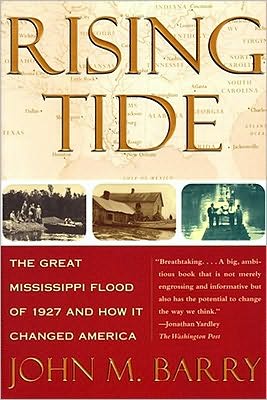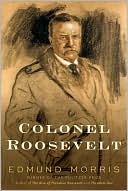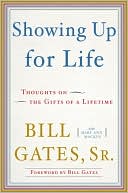Rising Tide: The Great Mississippi Flood of 1927 and How It Changed America
An American epic of science, politics, race, honor, high society, and the Mississippi River, Rising Tide tells the riveting and nearly forgotten story of the greatest natural disaster this country has ever known — the Mississippi flood of 1927. The river inundated the homes of nearly one million people, helped elect Huey Long governor and made Herbert Hoover president, drove hundreds of thousands of blacks north, and transformed American society and politics forever.\ A New York Times...
Search in google:
In 1927, the Mississippi River swept across an area roughly equal in size to Massachusetts, Connecticut, New Hampshire, and Vermont combined, leaving water as deep as thirty feet on the land stretching from Illinois and Missouri south to the Gulf of Mexico. Close to a million people - in a nation of 120 million - were forced out of their homes. Some estimates place the death toll in the thousands. The Red Cross fed nearly 700,000 refugees for months. Rising Tide is the story of this forgotten event, the greatest natural disaster this country has ever known. But it is not simply a tale of disaster. The flood transformed part of the nation and had a major cultural and political impact on the rest. Rising Tide is an American epic about science, race, honor, politics, and society. Rising Tide begins in the nineteenth century, when the first serious attempts to control the river began. The story focuses on engineers James Eads and Andrew Humphreys, who hated each other. Out of the collision of their personalities and their theories came a compromise river policy that would lead to the disaster of the 1927 flood yet would also allow the cultivation of the Yazoo-Mississippi Delta and create wealth and aristocracy, as well as a whole culture. In the end, the flood had indeed changed the face of America, leading to the most comprehensive legislation the government had ever enacted, touching the entire Mississippi valley from Pennsylvania to Montana. In its aftermath was laid the foundation for the New Deal of Franklin D. Roosevelt. John Opie ...[I]mplicates both the Mississippi River and the South in a deeper, darker side of the American experience....focuses on imperiously powerful personalities who willfully had their ways, often gravely flawed, to control the river....[The book reminds] us that Americans are just beginning to comprehend the power of their geography...(John Opie is a professor at New Jersey Institute of Technology). — Mississippi Quarterly
Prologue\ On the morning of Good Friday, April 15, 1927, Seguine Allen, the chief engineer of the Mississippi Levee Board in Greenville, Mississippi, woke up to the sound of running water. Rain was lashing the tall windows of his home near the great river with such intensity that the gutters were overflowing and a small waterfall poured past his bedroom. It worried him. He was hosting a party that day, but his concern was not that the weather might keep guests away. Indeed, he knew that the heavy rain, far from decreasing attendance, would bring out all the community's men of consequence, all as anxious as he for the latest word on the river.\ Tributaries to the Mississippi had already overflowed from Oklahoma and Kansas in the west to Illinois and Kentucky in the east, causing dozens of deaths and threatening millions of acres of land. The Mississippi itself had been rising for weeks. It had exceeded the highest marks ever known, and was still rising. That morning's Memphis Commercial-Appeal warned: "The roaring Mississippi river, bank and levee full from St. Louis to New Orleans, is believed to be on its mightiest rampage....All along the Mississippi considerable fear is felt over the prospects for the greatest flood in history."\ Now it was raining again. Hours later, with the rain heavier yet, the men of consequence appeared at Allen's door. Even LeRoy Percy appeared.\ No man mattered more in the Mississippi Delta, or perhaps anywhere the length of the river, than he. Sixty-seven years old, still imperious, thick-chested and vital, with measuring eyes, a fin-de-sicle mustache, silver hair, and frock coat, he seemed a figure from an earlier age. If so, he had been a ruler of that age, and in the Mississippi Delta he ruled even now. Not only a planter and lawyer but a former U.S. senator, an intimate of Teddy Roosevelt and William Howard Taft, and a director of railroads, the Carnegie and Rockefeller Foundations, and a Federal Reserve bank, Percy's political and financial connections extended beyond Washington and New York to London and Paris. Only his closest friends addressed him by his first name.\ At Seguine Allen's party that afternoon it was "Senator Percy, how are you?" and "Senator Percy, good to see you," and "Senator Percy, do you think the levees will hold?" Percy began to answer, but, as if to mock anything he might say, thunder shook the house, wind rattled the windows, and the rain suddenly intensified. The party fell silent. Men and women listened, holding food and cocktails — the Greenville elite separated themselves from hill-country Baptists by ignoring Prohibition with great show — uneaten and unsipped in their hands. The rain pelted the roof, the windows. The sounds of the black musicians echoed hollowly, then the musicians too fell silent before the great booming cracks of thunder and pelting rain.\ It had rained heavily for months. Henry Waring Ball, whose social rank fell somewhere between friend and retainer of the Percys, had recorded it in his diary. On March 7 it had been "rainy"; March 8, "pouring rain almost constantly for 24 hours"; March 9, "rain almost all night"; March 12, "after a very stormy day yesterday it began to pour in torrents about sunset, and rained very hearty until 10....[At] daylight, a steady unrelenting flood came down for four hrs. I don't believe I ever saw so much rain"; March 18, "a tremendous storm of rain, thunder and lightning last night, followed by a tearing wind all night....Today is dark, rainy and cold, with a gale blowing"; March 19, "rain all day"; March 20, "still raining hard tonight"; March 21, "Quite cold. Torrent of rain last night"; March 26, "Bad. Cold rain"; March 27, "still cold and showery"; March 29, "very dark and rainy"; March 30, "too dark and rainy to do anything." April 1, "Violent storm almost all night. Torrential rains, thunder, lightning, high winds"; April 5, "much rain tonight"; April 6, "rain last night of course."\ Finally, April 8, Ball wrote that "at 12 it commenced to rain hard. I have seldom seen a more incessant and heavy downpour until the present moment. I have observed that the river is high and it is always raining...we have heavy showers and torrential downpours almost every day and night....The water is now at the top of the levee."\ Since then, the Mississippi River at Greenville had risen higher than it ever had before. Now came this new rain, the heaviest yet.\ Indeed, no one present at Allen's party knew it, but the storm of Good Friday, 1927, was extraordinary for its combination of intensity and breadth. That day the great storm would pour from 6 to 15 inches of rain over several hundred thousand square miles, north into Missouri and Illinois, west into Texas, east almost to Alabama, south to the Gulf of Mexico. Greenville would receive 8.12 inches of rain. Little Rock, Arkansas, and Cairo, Illinois, would receive 10 inches. New Orleans would receive the greatest rainfall ever known there; in eighteen hours officially 14.96 inches fell, more in some parts. That amount, in less than a day, exceeded one-quarter the average precipitation New Orleans received in an entire year.\ Senator Percy, do you think the levees will hold?\ Allen addressed the question, reminding everyone that the levees were far stronger than they had ever been. They had held a record flood in 1922. They would hold this one. They would have the fight of their lives, but the levees, Allen assured everyone, would hold.\ Percy suggested that they inspect the levees right now. Perhaps the storm would uncover a weakness they could address. Others nodded. Two dozen men, including Allen, put on their gun boots and raincoats, piled into their cars, and drove the few blocks to the center of downtown, where the levee rose up abruptly. A few decades earlier the levee had been blocks farther west, but one day the river had simply devoured it, taking much of the old downtown as well. Since then the city had covered the levee adjacent to downtown with concrete to prevent a further loss to the river and to serve as a wharf, and the men drove up the slope of the levee itself, parking on its crest, even with third-story windows in the office buildings, high above the city streets, high above millions of acres of flat, lush Delta land. A hundred yards upriver, where the concrete ended, a work gang of a hundred black men under one white foreman struggled in the driving rain to fill sandbags. For hundreds of miles on both sides of the river, other black work gangs were doing the same thing. Then Percy, Allen, and the others climbed out of their cars; leaning against the wet wind, their boots seeking a purchase on the soaked concrete, they faced the river.\ It was like facing an angry dark ocean. The wind was fierce enough that that day it tore away roofs, smashed windows, and blew down the smokestack — 130 feet high and 54 inches in diameter — at the giant A.G. Wineman & Sons lumber mill, destroyed half of the 110-foot-high smokestack of the Chicago Mill and Lumber Company, and drove great chocolate waves against the levee, where the surf broke, splashing waist-high against the men, knocking them off balance before rolling down to the street. Out on the river, detritus swept past — whole trees, a roof, fence posts, upturned boats, the body of a mule. One man working on the levee recalled decades later, "I saw a whole tree just disappear, sucked under by the current, then saw it shoot up, it must have been a hundred yards away. Looked like a missile fired by a submarine."\ The river seemed the most powerful thing in the world. Down from the Rocky Mountains of Colorado this water had come, down from Alberta and Saskatchewan in Canada, down from the Allegheny Mountains in New York and Pennsylvania, down from the Great Smokies in Tennessee, down from the forests of Montana and the iron ranges of Minnesota and the plains of Illinois. From the breadth of the continent down had come all the water that fell upon the earth and was not evaporated into the air or absorbed by the soil, down as if poured through a funnel, down into this immense writhing snake of a river, this Mississippi.\ Even before this storm, levees along every significant tributary to the Mississippi had been shouldered aside by the water. In the East, Pittsburgh had seen 8 feet of water in city streets; in the West, outside Oklahoma City, 14 Mexican workers had drowned. And the Mississippi was still swelling, stretching, threatening to burst open entirely the system designed to contain it.\ At the peak of the great Mississippi River flood of 1993, the river in Iowa carried 435,000 cubic feet of water a second; at St. Louis, after the Missouri River added its waters, it carried 1 million cubic feet a second. It was enough water to devastate the Midwest and make headlines across the world.\ In 1927, a week after and a few miles north of where Percy and the others stood upon the levee, the Mississippi River would be carrying in excess of three million cubic feet of water each second.\ LeRoy Percy did not know the immensity of the flood bearing down upon him, but he knew that it was great. His family had fought the river for nearly a century, as they had fought everything that blocked their transforming the domain of the river into an empire, an empire that had allowed its rulers to go in a single generation from hunting panther in the cane jungle at the edge of their plantations to traveling to Europe for opera festivals. The Percys had fought Reconstruction, fought yellow fever, fought to build the levees, all to create that empire. Only five years earlier, to preserve it, LeRoy had fought the Ku Klux Klan as well. He had triumphed over all these enemies.\ Now the river threatened those triumphs, threatened the society his family had created. Percy was determined that, even if the river burst the levees, that society would survive. He had power, and he would do whatever was required to preserve it.\ Four hundred miles downriver from Greenville, the Mississippi flowed past New Orleans. There, a handful of men were Percy's peers, hunting and investing and playing poker with him, and belonging to the same clubs. Some were men of the Old South, controlling hundreds of thousands of acres of timber or sugar cane or cotton. Some were men of the New South, financiers and entrepreneurs. Some, like Percy, bridged those worlds. For decades they had controlled New Orleans and the entire state of Louisiana.\ The river threatened their society too. And like Percy, they would do whatever was required to preserve it.\ Their struggle, like Percy's, began as one of man against nature. It became one of man against man. For the flood brought with it also a human storm. Honor and money collided. White and black collided. Regional and national power structures collided. The collisions shook America.\ On the levee in downtown Greenville, the men watched the river rage for a few more minutes. The rain stung. The river was, literally, awful. Yet they took a certain pride in its awfulness, in the greatness of the river. Confronting it made them larger. For a few more minutes, frozen by it, they stood there.\ When they left, neither Senator Percy nor anyone else, not even Seguine Allen, the host, returned to the party. They would not go home for hours; some would not go home for days. They had work to do.\ Copyright © 1997 by John Barry
ContentsPrologue 13Part One: THE ENGINEERS 19Chapter One 21Chapter Two 32Chapter Three 46Chapter Four 55Chapter Five 67Chapter Six 78Part Two: SENATOR PERCY 93Chapter Seven 95Chapter Eight 107Chapter Nine 122Chapter Ten 132Chapter Eleven 143Chapter Twelve 156Part Three: THE RIVER 169Chapter Thirteen 173Chapter Fourteen 179Chapter Fifteen 190Chapter Sixteen 202Part Four: THE CLUB 211Chapter Seventeen 213Chapter Eighteen 222Chapter Nineteen 234Chapter Twenty 245Part Five: THE GREAT HUMANITARIAN 259Chapter Twenty-One 261Chapter Twenty-Two 272Chapter Twenty-Three 282Part Six: THE SON 291Chapter Twenty-Four 293Chapter Twenty-Five 303Chapter Twenty-Six 318Chapter Twenty-Seven 324Part Seven: THE CLUB 337Chapter Twenty-Eight 339Chapter Twenty-Nine 344Chapter Thirty 352Part Eight: THE GREAT HUMANITARIAN 361Chapter Thirty-One 363Chapter Thirty-TwO 378Chapter Thirty-Three 387Part Nine: THE LEAVING OF THE WATERS 397Chapter Thirty-Four 399Chapter Thirty-Five 412Appendix:The River Today 423Notes 427Bibliography 481Acknowledgments and Methodology 497Index 501
\ David FutrelleOn a quiet day, the Mississippi River seems to flow as gently as a burbling brook, but that outward calm is deceiving. "The Mississippi never lies at rest," John M. Barry writes in his often fascinating account of the Great Flood of 1927. "It roils. It follows no set course. Its waters and currents are not uniform. Rather, it moves south in layers and whorls, like an uncoiling rope made up of a multitude of discrete fibers, each one following an independent and unpredictable path, each one separately and together capable of snapping like a whip." And when the river begins to fill with more water than it can handle, it becomes quite a formidable force indeed -- as generations of Americans have learned.\ Rising Tide tells the story of a slow-motion, not-quite-natural disaster of tremendous proportions. The proximate cause of the disaster was the rain that fell on the Midwest in torrents for months and months without pause, saturating the earth and overflowing the innumerable tributaries that flow into the Mississippi River. But the disaster was magnified, as many disasters are, by human hubris -- in this case the hubris of 19th century engineers who firmly believed (with typical Victorian confidence) that even this great river could be reined in. The levees they built to contain the river in many ways exacerbated the disaster, raising it to higher levels and increasing both its speed and its force -- so that when the levees fell (as, faced with the record rains of 1927, they inevitably would) the damage was more severe than would have been the result of a flood uncontained, or better controlled with a combination of outlets and reservoirs alongside the levees. Ultimately, nearly one million Americans were left homeless by the flood. Several hundred lost their lives, it is estimated.\ Barry tells the tale of the flood through the stories of the "large men" whose words and actions most influenced its course -- from head Army engineer Andrew Atkinson Humphreys, whose stubborn insistence on a "levees only" policy in the 19th century contributed mightily to disaster in the 20th, to powerful Sen. LeRoy Percy of Mississippi (grandfather of novelist Walker Percy). Though at its best it's as gripping as a good disaster flick, Rising Tide can meander as unpredictably as the river itself. Barry spends too much time hashing over biographical details and not enough elucidating the effects of the river's slow fury.\ Despite these flaws, Rising Tide is both a bracing history and a cogent warning. In an age when self-professed futurists speak blithely of living in virtual worlds beyond the prison of human flesh and the laws of physics, it is worth remembering that nature has a habit of reasserting itself. -- Salon\ \ \ \ \ \ John Opie...[I]mplicates both the Mississippi River and the South in a deeper, darker side of the American experience....focuses on imperiously powerful personalities who willfully had their ways, often gravely flawed, to control the river....[The book reminds] us that Americans are just beginning to comprehend the power of their geography...(John Opie is a professor at New Jersey Institute of Technology). — Mississippi Quarterly\ \ \ Publishers WeeklyThe worst natural disaster in U.S. history, the Mississippi River flood of 1927, which killed more than 1000 people and left 900,000 homeless from Cairo, Ill., to New Orleans, had a far-reaching impact on American society, as revealed in this gripping grassroots epic, redolent with gothic passions of the Old South. The flood shattered the myth of a quasifeudal bond between Delta blacks and the Southern aristocracy. African American flood victims were the principal occupants of squalid Red Cross refugee camps rife with profiteering, pellagra and murders and beatings of blacks by white policemen and civilians. Barry reports that black refugees were given just enough food to avoid starvation, were denied federal reparation through legalistic maneuvers and were compelled by gun-wielding National Guardsmen to work on dangerous levees. The flood triggered an exodus of Southern blacks to Chicago and Los Angeles, among other cities. The cataclysm also marked a watershed, the author persuasively argues, because although the Coolidge administration did virtually nothing to help flood victims recover economically, a public outcry shifted U.S. opinion toward favoring a more activist federal government. The flood made Herbert Hoover, Coolidge's commerce secretary, a national hero, solidifying his presidential ambitions after he headed a special federal rescue effort to handle the emergency. An extraordinary tale of greed, power politics, racial conflict and bureaucratic incompetence, Barry's saga begins in the 1870s as two influential engineers-James Eads, who built a Mississippi-spanning bridge in St. Louis, and army surveyor Andrew Humphreys-battle over how to contain the wild, erratic river. The focus then shifts to Mississippi's powerful Percy family-to railroad magnate W.A. Percy, pioneer of the sharecropping system; to his son LeRoy, banker, plantation owner, senator, who protected blacks against demagogues and the Ku Klux Klan; to poet and lawyer Will (LeRoy's son), ineffectual head of a flood relief committee; and to novelist Walker Percy, Will's blood cousin and adopted son. A cast of power-hungry villains and crusading reformist heroes rounds out this momentous chronicle, which revises our understanding of the shaping of modern America. Photos. BOMC and History Book Club alternate. (Apr.)\ \ \ \ \ Library JournalIn the spring of 1927, America witnessed perhaps its greatest natural disaster: a flood that profoundly changed race relations, government, and society in the Mississippi River valley region. Barry (The Transformed Cell, LJ 9/1/92) presents here a fascinating social history of the effects of the massive flood. More than 30 feet of water stood over land inhabited by nearly one million people. Almost 300,000 African Americans were forced to live in refugee camps for months. Many people, both black and white, left the land and never returned. Using an impressive array of primary and secondary sources, Barry clearly traces and analyzes how the changes produced by the flood in the lower South came into conflict and ultimately destroyed the old planter aristocracy, accelerated black migration to the North, and foreshadowed federal government intervention in the region's social and economic life during the New Deal. His well-written work supplants Pete Daniel's Deep'n as It Come: The 1927 Mississippi Flood (1977) as the standard work on the subject. Recommended for public and academic libraries. [Previewed in Prepub Alert, LJ 12/96.]-Charles C. Hay III, Eastern Kentucky Univ. Libs., Richmond\ \ \ \ \ Jason Berry[This] gripping account of the mammoth flooding of 1927 that devastated Mississippi and Louisiana and sent political shockwaves to Washington....is a brilliant match of scholarship and investigative journalism. -- Chicago Tribune\ \ \ \ \ Jim Squires"An important contribution to history and literature." -- Los Angeles Times\ \ \ \ \ John Opie...[I]mplicates both the Mississippi River and the South in a deeper, darker side of the American experience....focuses on imperiously powerful personalities who willfully had their ways, often gravely flawed, to control the river....[The book reminds] us that Americans are just beginning to comprehend the power of their geography...(John Opie is a professor at New Jersey Institute of Technology). -- Mississippi Quarterly\ \ \ \ \ Jonathan YardleyBreathtaking...a big, ambitious book that is not merely engrossing and informative but also has the potential to change the way we think. -- The Washington Post\ \ \ \ \ The New YorkerThe story...has the power of an epic....A virtuoso piece of exposition.\ \ \ \ \ Kirkus ReviewsA devastating flood is both the protagonist and the backdrop of this brilliantly narrated epic story of the misuse of engineering in thrall to politics.\ Over thousands of years of periodic floods, the Mississippi River deposited millions of acres of rich alluvial soil. Then, in the aftermath of the Civil War, farmers (and politicians) began demanding that the river be contained, so they could reap the soil's wealth. Former Dun's Review staffer Barry (The Ambition and the Power, 1989) describes how the supremely confident engineers of 19th-century America jumped cockily to the challenge, their attitude typified by James Buchanan Eads, who said in 1874 that he believed man was now "capable of curbing, controlling and directing the Mississippi, according to his pleasure." By the 1920s engineers could brag that they had accomplished what Eads had promised. Stretches of the river were lined with massive levees 30 feet high and 188 feet wide at their base. But then, in 1927, came a flood of almost biblical proportions, and people paid for the engineers' hubris. The flood caused hundreds of deaths, hundreds of thousands of refugees, hundreds of millions in damages—and, Barry argues, the destruction of a way of life, as black sharecroppers fled north for good. Barry's narrative features outsized characters: engineers like Eads; plantation owners like LeRoy Percy, who created an almost feudal Mississippi sharecropping empire; and assorted members of New Orleans's elite, so powerful that they saved their city's bond rating by diverting the flood to their less politically connected neighbors.\ A fascinating, cautionary tale of humans versus nature that suffers only in its abrupt ending: Barry doesn't establish whether the flood offered more than a temporary setback to overconfident engineers and short-sighted business leaders. He barely mentions the devastating flood of 1993 or the renewed debates it engendered about controlling the Mississippi. Perhaps he's saving that story for a sequel.\ \ \








